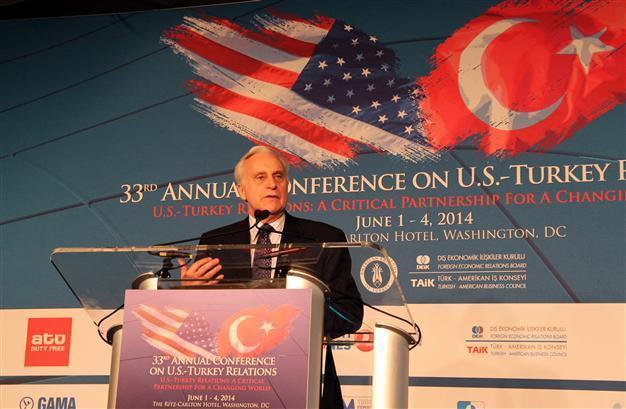Turkey, US in new security cooperation on Syria

Frank Ricciardone, the U.S. Ambassador to Ankara. AA Photo
Frank Ricciardone, the U.S. Ambassador to Ankara made important remarks regarding the “national security” of both countries, speaking in the farewell lunch given to him by Turkey’s Foreign Economic Relations Board (DEİK) in Istanbul on June 5.
Mentioning the need of working together, Ricciardone listed the area’s need for the cooperation of countries such as Ukraine, Syria, Iraq, Iran in the context of the nuclear program, the search for a lasting Cyprus solution, and the normalization in Turkish-Israeli relations for “peace and stability in the eastern Mediterranean.”
He said the work in those fields was being carried out with the means of “diplomacy, law enforcement [for example Turkey’s borders], intelligence and security.”
Then came the important sentence. The ambassador underlined that they “would not give details on intelligence” matters, but “important national security cooperation” was “going on.”
But Ricciardone did not give any further details.
But all indications on the Turkish and American sides show both countries have started a new and extensive security/intelligence cooperation regarding Syria, and especially with the “foreign fighters” problem sourcing from the three-year-old civil war in the country.
Right after U.S. President Barack Obama’s speech at the West Point Military Academy on May 28, in which he pledged to “ramp up support” to opposition groups in Syria, the Tayyip Erdoğan government in Turkey announced on June 3 that al-Nusra had been included in the “terrorist organizations” list of Turkey.
This was something that the U.S. and a number of NATO governments have been asking from Turkey, since al-Nusra declared in 2013 that it was the representative of al-Qaeda in Syria. So with those two developments, the U.S. has agreed to get involved with the Syrian civil war, (some speculate in order to hurt Russia because of its Crimean “gambit” in Ukraine), in military and intelligence terms, short of sending troops there. As such, Turkey has adopted a new Syrian line parallel with the U.S. and generally the West.
One might expect that the level of cooperation, which seems to have started a few months ago, possibly before the March 30 local elections in Turkey, might step up following the U.S. and Turkey to find common ground regarding Syria after three years of disagreements behind closed doors.
Indeed, the cooperation involves the “national security” of both countries, because it focuses on the "foreign fighters in Syria" problem. According to intelligence estimates, there are around 8,000 passport holders of American and European countries fighting in Syria since the civil war started, who have traveled to Syria to fight among jihadist organizations, mostly al-Nusra.
They mostly travel through Turkey (and some through Jordan), as Turkey does not ask for visas from American and European countries. Those passport holders from Western countries (some of North African, Arab-origin, some of Western-looking Balkan and North Caucasus-origin and some native converts to Islam) come to Turkey, mostly to Istanbul, on tourist visas, before finding their way to some point of the 910km-long Turkish border with Syria. According to findings from security sources, they cross the border illegally, or legally, again posing as tourists, are trained and fight there, and those who are not killed in the fight travel back to their countries as tourists from abroad, again mostly through Turkey. Now there are estimated to be hundreds of such fighters who have returned to their lands. The Boston bombings of 2013 showed what can two brothers without proven organizational links could do; it is not difficult to imagine what mostly al-Qaeda trained dedicated people could do.
And those fighters are not only from the U.S. They could be from France, Britain, Spain, Germany, the Netherlands, even Norway; we are talking about the national security concerns of many countries here, not only of the U.S. and Turkey. So the ongoing security operation is likely to involve the intelligence and security services of a number of countries, besides the American CIA and Turkish MİT and it is likely to be one of the most extensive anti-terrorism cooperation measures in recent times.
The details are not clear yet, but Istanbul is likely to be a major hub for the security cooperation.
